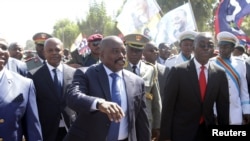President Joseph Kabila is due to step down as head of state of the Democratic Republic of Congo in December but it is looking increasingly likely that this year's election will be delayed. Statements this week by the president and the lead opposition figure, now in exile, underscore the uncertainty of the central African nation's political future, and the potential flash points ahead.
President Joseph Kabila’s Independence Day speech was pre-recorded, as usual — Kabila is a famously reluctant public speaker — but his words were anything but timid.
The defiant head of state summoned the Congolese people to resist what he called “untimely and unlawful foreign interference.” He repeatedly praised his security services.
His comments are seen as a direct response to targeted sanctions imposed by the U.S. government on one of Kabila’s most senior police chiefs on June 23.
The U.S. government, as well as members of Congress, have accused the Kabila government of deliberately delaying elections that should take place in November and of cracking down on the opposition and civil society. Further sanctions may be forthcoming.
This was supposed to be Kabila’s final Independence Day as president. The nation's constitution limits him to two terms in office.
But it is looking unlikely the polls will be held this year. The electoral commission says it needs more than a year to prepare the voter rolls. And the Constitutional Court ruled in May that Kabila can stay in power until the election is held.
In his speech, the president insisted voter registration will start imminently and that nothing can stop the election from happening.
But in recent weeks, senior officials close to Kabila have spoken publicly of holding a constitutional referendum first. If the people of Congo want more Kabila, they ask, why should they be denied?
Hans Hoebeke is a senior Congo analyst at the International Crisis Group.
“The moment voter registration reaches its end, I am sure that this will become a concrete proposal," he said. "If they get away with prolonging the reign, if the people remain generally speaking quiet, then I think they are going to try it. I’m not saying they are going to succeed, but I think they are going to try it.”
And there is recent precedent. The leaders of two of Congo’s neighbors, Congo-Brazzaville and Rwanda, have successfully removed term limits through referendums and won fresh terms in office in the past year.
For more than a year, Kabila has invited the opposition to participate in a political dialogue. Edem Kodjo, a former Togolese prime minister, is facilitating the efforts on behalf of the African Union.
Most influential opposition leaders remain publicly hostile to Kabila’s offer. They dismiss the dialogue as a trap and have begun to ask for U.S. involvement on the facilitation panel. But qualified support can be found.
Juvenal Munubo is a parliamentarian from one of the largest opposition parties.
He told VOA that a dialogue acceptable to all sides is the country’s last chance and must provide clear answers to two essential questions: On what date shall the presidential election take place and who shall lead the DRC once Kabila’s elected mandate expires December 20? For Munubo, if these questions can be answered, the main problems disappear and the election need not take place in 2016.
More time could work in the opposition’s favor.
At present, there is no obvious opposition presidential candidate and the separate coalitions are still trying to form a united front.
Moise Katumbi points to the size of the fight on their hands. As yet the only politician to declare his intention to contest the presidential election, Katumbi left the Democratic Republic of Congo in May. He was the subject of two sets of legal charges, one of them over the alleged hiring of foreign mercenaries. In June, he was sentenced in absentia to three years in prison. Returning home to campaign is currently out of the question.
Katumbi issued his own Independence Day statement. He said Kabila must leave power this year. Katumbi condemned the charges against him as a crude means of preventing his candidature.
The government brushed it off, calling Katumbi's statement a “pathetic diatribe.”









